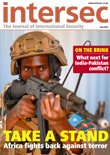Watching brief
Paolo Zucconi examines Iran’s missile programme and wonders just how concerned we should be about its nuclear capabilities
On 13-14 February, the Ministerial to Promote a Future of Peace and Security in the Middle East took place in Warsaw. This United States-sponsored Middle East peace conference was considered by the US Secretary of State, Mike Pompeo, an important element of making sure that Iran is not a destabilising influence. As a consequence, the Iranian Minister of Foreign Affairs, Mohammad Javad Zari, called the summit America’s anti-Iran circus, revealing, once again, the deep contrast between the two countries. It is certainly too early to assess the long-term effects of this summit and there is not yet much information on the outcome. However, due to the absence of the most important regional actors (Iran, Syria, Lebanon, Qatar, the Palestinian Authority), it was expected to be a missed opportunity to peacefully settle regional disputes (ie conflicts in Syria and Yemen, humanitarian issues, weapons of mass Destruction proliferation, terrorism, hybrid warfare, energy security). The High Representative of the European Union for Foreign Affairs and Security Policy, Federica Mogherini, boycotted the meeting, while France and Germany sent low-level delegations. The absence of European Foreign Ministers demonstrates that the US’ approach towards Iran can have a negative effect on US/European relations, forcing EU member states to confront America on its Middle East agenda.
Moreover, the Middle East conference took place at the same time of the fourth Syria meeting, which included informal talks among Russia, Belarus, Iran and Turkey for facilitating the Syrian peace settlement.
Therefore, the Warsaw conference showed its anti-Iran approach and limits, while the goal was strategically relevant (the peace process in the Middle East). Not involving Iran, Syria, Turkey, Palestine and Russia makes it particularly difficult for any efforts of implementation of any peace plan. The meeting was thus part of an anti-Iranian campaign, President Trump reinvigorated in the last few years, significantly changing the US foreign policy agenda since 2016.
Few key examples include President Trump’s decision to withdraw from the Joint Comprehensive Plan of Action (the Iranian nuclear deal) in May 2018, the announced withdrawal of about 7,000 troops from Afghanistan and 2,000 from Syria (December 2018) and, more recently, withdrawal from the Intermediate-Range Nuclear Forces (INF) treaty.
This has been justified as treaties affecting America’s role worldwide. Nevertheless, the US remains involved in those regions (like the Middle East) where the treaties apply, but without a clear diplomatic infrastructure and political agenda.
The US President’s intention to scrap a historic nuclear arms-control pact with Moscow, the nuclear deal with Iran and, more in general, his willingness to reduce America’s role overseas to focus on internal issues is based on a contradictory strategy that may affect regional security deeply with unpredictable destabilising effects.
Firstly, it looks like the US Government works on a disengagement policy from regions no longer a priority in the agenda (ie Europe, some parts of the Middle East) to implement the America-first approach.
However, the United States cannot withdraw completely from the region. The Middle East plays a key role in its energy requirements and weapons export. From 2012 to 2015, the US defence industry exported about $54,6 billion in the region (mostly Gulf states) and we expect it to rise in the next few years.
Furthermore, US energy independence has not been achieved yet and the country still needs oil and gas imported from the Middle East. What is happening is a revision of the regional policy, now characterised by a reinvigorated alliance with Ryad and Tel Aviv, to isolate Tehran (considered a serious regional threat and sponsor of terrorism). The US Special Representative for Iran, Brian Hook, defined Iran as an increasing threat to regional peace and stability.
The nuclear deal was not the best achievement but helped to have some sort of control over the Iranian expectations on nuclear, even if Tehran never stopped its anti-Israel and anti-American propaganda over the years. This deal imposed important restrictions on Iran’s nuclear activities and introduced a verification system to ensure compliance with its provisions. The new US sanctions affect this as well as expectations of cooperation between Tehran and the international community. These sanctions may work otherwise, impoverishing the country and local population economically. This could also bring additional destabilisation to a region already affected by armed conflicts and regional tensions.
As reported by journalist Jonathan Marcus, the risk of an Iranian breakout could encourage others, like Saudi Arabia, to go nuclear too. As mentioned by John Glaser, sanctions have a generally poor track record of actually changing the behaviour of the target state in the direction desired by the sanctioning country.
In 2017 and early 2018, thousands of Iranians protested to convince the Government to increase salaries and improve socioeconomic conditions. The authorities arrested about 7,000 people while a further 26 people died. This shows social unrest, partially due to the US economic sanctions.
As part of the nuclear deal, sanctions were reduced, which and could help the Iranian economy, but without the United States the deal has lost its credibility. The anti-Iranian alliance the White House carries on with Saudi Arabia and Israel to counter Iran’s missile programme (now a top priority in the US agenda) and Iran’s role in Syria can polarise relations and the region further, especially if the growing anti-Iranian narrative continues. Therefore, Iran is unwilling to negotiate its national missile programme.
The White House expects sanctions to make Iran poor with limited resources to carry out its space and missile programme. However, as mentioned by the US Congressional Research Service, Iran has been acquiring, developing and testing its short and medium-range ballistic missile capabilities for decades. It has no scientific restrictions to develop the range of its missiles, but according to its military doctrine is working on increasing the precision of the missiles to be used as conventional deterrence, rather than increasing range.
The space launch programme is used to encourage both nationalism and patriotism as well as Iran’s international reputation as a growing regional power. Furthermore, it is used to make Iran a potential leader in the Middle East, offering space launch and satellite services. Iran’s intention is to plan future launches for placing intelligence-gathering satellites into orbit, although it looks unlikely in the short term. Proliferation experts assess that this capability will take a decade to be operational.
When it comes to the Syrian conflict, in which Iran plays a key role, the US decision to withdraw troops from Syria might have two consequences. Firstly, affecting control of some parts of the Shia corridor (stretching from Iran to the Mediterranean Sea), so compromising the goal to isolate Tehran and reinvigorating Syria’s importance.
Secondly, allowing Russia to become mediator among Assad’s regime, Kurds (former US allies against Daesh) and Turkey. So the results of Trump’s decisions could be opposed to his expectations.
All of those events are part of what the International Institute for Strategic Studies analysts called in 2015, “strategic unease”, a slow but steady long-term deterioration of the global rule-based order. Conflicts in Libya, Yemen and especially the US’ contradictory foreign policy agenda have significant impacts on Middle East (in)stability and contribute to deterioration.
As far as Iran’s security and defence policy, until the US withdrawal from the nuclear deal, we can expect the missile programme as a strategy to maintain national pride and guarantee internal stability rather than a regional threat. After the withdrawal, due to the loss of credibility of the deal and the restored economic sanctions (ie oil and banking sectors), there are increasing concerns about Iran’s foreign and defence policy in the region in the short-to-medium term. First of all, Iran’s role in regional conflicts (ie proxy war in Yemen, Syrian conflict, support for Hamas) could prove to be an obstacle in the reinvigorated US alliance with Israel and Saudi Arabia. Secondly, a potential breakout from the deal. Should the Iranian Government come to the conclusion that economic benefits coming from Europe do not meet the country’s demand, it may be encouraged to breakout (even if this does not mean developing military nuclear capabilities). Thirdly, nuclear proliferation in the region. In case of Iranian breakout, the immediate perception would be that Tehran wants to go nuclear again. This might be an incentive for WMD proliferation (Saudi Minister Adel Al-Jubeir mentioned, in May 2018, the possibility to go nuclear as self defence).
Furthermore, continuing to implement sanctions as well as diplomatic pressure on the most important Iranian ally, Russia (ie withdrawal from the INF treaty), strengthens Russia-Iran relations and pushes Tehran further into Russian influence. This could compromise efforts for de-escalation (only possible by involving Moscow) and may replace nuclear escalation with missile escalation. Failure to implement the nuclear deal and the disproportionate sanctions will risk destabilising Iran internally or to force a breakout.
Therefore, the current situation may worsen unless serious, direct diplomatic negotiations start between the United States and Iran. The European Union seems unable to guarantee sustainable improvement on the matter and appears to be more focused on avoiding US penalties for European companies. Being concerned about Iran’s offensive military capabilities and role in regional conflicts is understandable and fair, especially because Tehran will not trade in sanctions for concessions on its missile programme. However, it is also important to make sure economic pressure is proportional. There is an urgent need both to promote direct US-Iran negotiations and better US-EU relations, because frictions between the US and Europe are expected to increase, while Iran grows increasingly closer to Russia.
Paolo Zucconi – Osservatorio Analitico’s Political Risk and Country Analyst – has worked as intern at the George C. Marshall European Center for Security Studies. He holds a master’s degree in International Security Studies, a postgraduate certificate in Intelligence and National Security and a bachelor’s degree in Political Science and International Relations.









